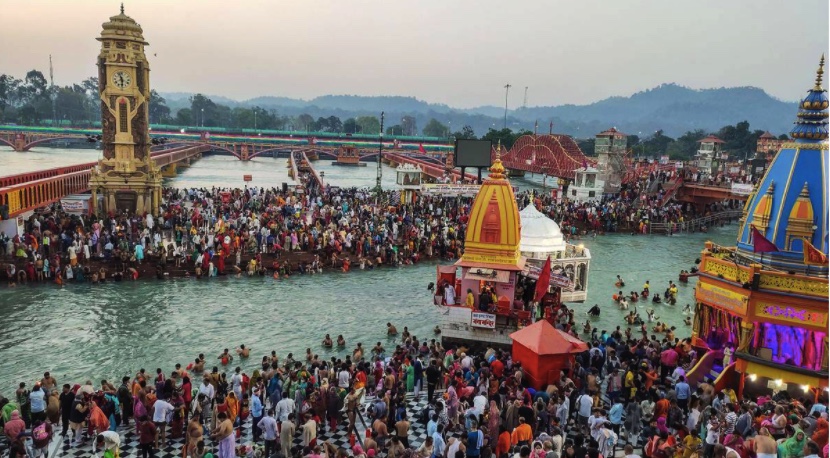
COVID-19 Peak in India, Exam Worry for Students and the Cost of COVID
A resurgent wave of Covid hits India hard
The biggest news last week in India was the relentless rise in the number of Covid cases. The daily rate of infections in India has been soaring since March and, on April 14, it touched nearly 200,000 cases in a day. The total number of people infected since the virus was first detected in India now stands at over 14 million, which is second to only the United States where the total number of cases recorded stands at 32 million-plus. With the latest surge in the virus, India has beaten Brazil, which has recorded more than 13.5 million cases.
Comparing absolute numbers such as those really means little because compared to India’s population of nearly 1.4 billion, the number of people living in Brazil (211 million) and the US (330 million) is piffling. So, in percentage terms, the spread of the virus in India is not as widespread as it is in those two countries. But, tackling a situation where the number of cases is as high as India’s along with a spurt in daily infection rates is an enormously challenging task.

Yet, surprisingly, it would seem that in some instances the seriousness required to rise up to that challenge is missing. Around the same time that the resurgence of Covid hit India, the Indian authorities allowed pilgrims to gather for Kumbh Mela, the religious ceremony of dipping in the Ganges at Haridwar in northern India. Last week, millions of devotees, most of them maskless, descended at the site where it is believed that a dip in the Ganges is auspicious on particular dates. On one such day, last Monday, the number of pilgrims was to the tune of five million.
In the first 48 hours since the Mela began, tests that were conducted there revealed that at least 1300 people tested positive. Many believe that is just a drop in the Ganges because neither are the tests conducted in large numbers nor is anyone going for such pilgrimages able to maintain stipulations such as social distancing or other precautions.
The Kumbh Mela is a particularly auspicious Hindu ritual. The event is quite easily the world’s largest pilgrimage that is held at periodic intervals. During the ritual, pilgrims “wash their sins” in the Ganges whose waters, they believe, turn into “nectar of immortality” on those auspicious dates. Even in the best of times, the logistics of managing millions of people crowded into a small area is a challenge that can be daunting. At a time when the Covid virus is spreading like wildfire in India, it can be a nightmare.
It is inconceivable that millions of people, mostly traveling without Covid-era restrictions, will be tested with meticulous thoroughness. It is conceivable, however, that an event like that, which began on 8 April and will end on 8 May (the actual dipping in the Ganges spans a shorter period within those dates) and which is attended by millions, can become a launching pad for super-spreading of the pernicious virus that is currently causing a pandemic.
Postponed exams cause worry for students
Even as maskless pilgrims in millions descended, restriction-free, for a sacred Hindu ritual, the government decided to cancel the Central Board for Secondary Education (CBSE) exams, which two million students across India were supposed to take during April and May. Instead of the exams, conducted at the end of Class 10, students will be automatically promoted to the next class. In addition, the school-leaving examinations, held at the end of Class 12, have been postponed till at least June. This will affect at least 1.8 million students.

The moves to cancel or postpone those public examinations have created adverse reactions among students who fear that this could delay their academic programs and university entrance processes. Of particular ire is the fact that the government has not thought of restrictions when it comes to mammoth pilgrimages such as the Kumbh Mela or the massive rallies that have been held or are still being planned as political parties hectically campaign for elections in several states, including the crucial polls in West Bengal.
The real costs of Covid could come later
As everywhere else in the world, the economic costs of the Covid virus in India could be felt for a long time, even after the virus’s spread slows down and restrictions are lifted. The virus has hit India’s most prosperous and industrialised state, Maharashtra, the hardest. And this has already begun having repercussions on the economy.
Lockdowns and the rapid spread of the virus in the state (last Wednesday, the state recorded nearly 60,000 cases) are expected to hit the consumer industries such as automobiles, durables, and appliances. The state accounts for a sizable share of the production of these categories and disruptions can cause shortages across India.
In addition, the Indian rupee has hit a nine-month low, inflation could rise, and employment growth could slow down. Analysts expected India’s GDP growth rate to bounce back in February when the virus showed signs of slowing down. Now, with the second wave of the virus’ spread gathering momentum, those expectations are being diluted down. India’s economic outlook for the coming year looks more uncertain than ever.



